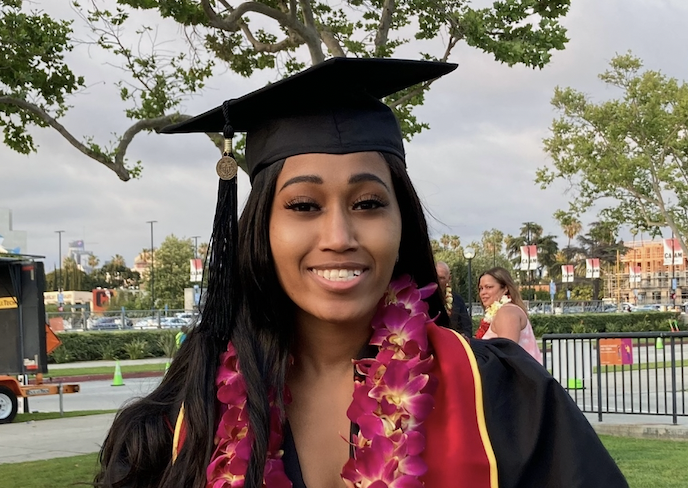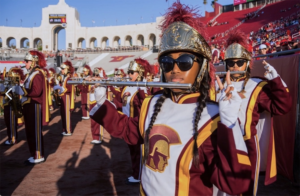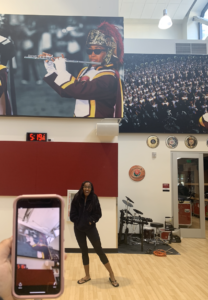
In this series of alumni profiles, we highlight graduates of USC’s master of science program in stem cell biology and regenerative medicine. Our accomplished alumni have pursued many different paths—ranging from a biotech industry job to a teaching career, and from a PhD program to professional degrees in medicine, dentistry, and law. Forty-one master’s students graduated as part of the Class of 2022, we are delighted to welcome them into our vibrant, diverse, and growing community of alumni. Congratulations Class of 2022, and Fight On!
–Francesca Mariani, master’s program director
USC alumna Tiffany Mays is equally adept at playing the flute and pipetting into a flask. So it’s only fitting that Wolfgang Amadeus Mozart influenced one of her first forays into scientific research.
“My first science experience was through the American Museum of Natural History in New York City where I did a program for high school students after school,” said Mays, who is currently preparing to defend her thesis as part of USC’s master of science program in stem cell biology and regenerative medicine. “My project was on the morphological diversity of the North American starling, and I actually chose the project because I was performing the Mozart concerto ‘Magic Flute’ at the time. I read that Mozart had a pet starling, and so I decided to combine both of these interests into one.”
This early research experience confirmed that science was her calling. For her undergraduate degree, she chose to attend USC, where she majored in human biology with an applied physiology focus and minored in health care studies, and performed research about how cells grow and divide in the lab of Matthew Michael at the USC Dornsife College of Letters, Arts and Sciences.
After taking the course MEDS 380 Stem Cells: Fact and Fiction, she decided to pursue more clinically focused research in the lab of David Cobrinik at Children’s Hospital Los Angeles. In the Cobrinik Lab, she studied genes that affect the progression of a childhood eye cancer called retinoblastoma.

As a USC undergraduate, Mays also continued to play the flute as a member of the Trojan Marching Band. As a member of the self-proclaimed “greatest marching band in the history of the universe,” she not only enjoyed front row seats to every football game, but also made lifelong friends and traveled the world.

“There’s actually a picture of me—a whole wall—in the marching band office,” she said. “I walked in one day, and it’s huge! It’s about 6 feet.”
After graduating with her bachelor’s degree, Mays completed USC’s one-year master of science program in stem cell biology and regenerative medicine. Through the program, she joined the lab of Unmesh Jadhav, where she studied the role of a gene known as EZH2 in a variety of cancers, including colorectal, breast and prostate cancer. She continued this project through the master’s program’s optional second research year, which culminates in a formal thesis project.
“When I started in Unmesh’s lab, he really had an emphasis on learning the material, reading the papers, and thinking of your own ideas,” said Mays. “That helped me figure out how I can think as a scientist and solve problems.”
During the master’s program, Mays also pursued a summer internship at Krystal Biotech, which is developing gene therapies to treat rare diseases.
After defending her master’s thesis this summer, Mays will start pursuing her PhD in the Driskill Graduate Program in Life Sciences, studying cancer biology at Northwestern University, where she was awarded a fellowship from the Graduate School for her research interests, strong background, and exceptional promise as a scholar. She will also have the option of simultaneously earning a second master of science degree in clinical investigation to understand the intersection between translational and clinical research, and a certificate in management for scientists and engineers through the Kellogg School of Management. One day, she hopes to start her own lab and biotech company. Eventually, she might also pursue an MD with a specialty in pediatric oncology.
“Long-term,” she said, “I want to feel that I’m going to have an effect on somebody and impact their life in a positive way.”
